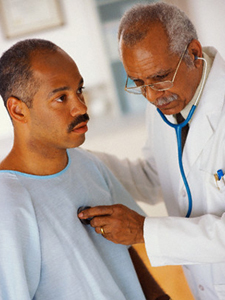(ThyBlackMan.com) Hormone changes are a natural part of aging. Unlike the more dramatic hormone plunge that occurs in women during menopause, however, hormone changes in men generally occur more gradually over a period of many years. Sometimes called male menopause, these aging-related hormone changes in men are very different from those in women.
But what should you expect? What you can do about it?
Is It Really “Menopause”?
The term “male menopause” is sometimes used to describe decreasing testosterone levels related to aging. Female menopause and so-called male menopause are two different situations, however:
• In women, ovulation ends and hormone production plummets during a relatively short period of time.
• In men, hormone production declines more gradually. The effects — such as changes in sexual function, energy level or mood — tend to be subtle and may go unnoticed for years.
So what’s the best way to refer to so-called male menopause? Many doctors use the term “andropause” to describe aging-related hormone changes in  men. Other terms for so-called male menopause include testosterone deficiency, androgen deficiency of the aging male and late-onset hypogonadism.
men. Other terms for so-called male menopause include testosterone deficiency, androgen deficiency of the aging male and late-onset hypogonadism.
Understanding Male Hormones
Testosterone levels vary greatly among men. In general, however, older men tend to have lower testosterone levels than do younger men. Testosterone levels gradually decline throughout adulthood — about 1 percent a year after age 30 on average. By about age 70, the decrease in a man’s testosterone level can be as much as 50 percent.
Still, it’s important to have a thorough medical evaluation before attributing low testosterone to normal aging, since many medical conditions, if left untreated (such as obstructive sleep apnea), may decrease testosterone levels as well.
What Are The Symptoms?
Some men have a lower than normal testosterone level without signs or symptoms. For others, low testosterone may cause:
• Changes in sexual function. This may include reduced sexual desire, fewer spontaneous erections — such as during sleep — and infertility. Your testes may become smaller as well.
• Changes in sleep patterns. Sometimes low testosterone causes insomnia or other sleep disturbances.
• Physical changes. Various physical changes are possible, including increased body fat, reduced muscle bulk and strength, and decreased bone density. Swollen or tender breasts (gynecomastia) and hair loss are also possible. In addition, you may experience hot flashes and have less energy.
• Emotional changes. Low testosterone may contribute to a decrease in motivation or self-confidence. You may feel sad or depressed, or have trouble concentrating or remembering things.
It’s important to note that some of these signs and symptoms are a normal part of aging. Others can be caused by various underlying factors, including medication side effects, thyroid problems, depression and excessive alcohol use.
A blood test is the only way to diagnose a low testosterone level.
What Do I Need To Do To Feel Better?
If you suspect that you have a low testosterone level, consult your doctor. He or she can evaluate possible causes for your signs and symptoms and explain treatment options. You can’t boost your natural testosterone production, but these steps may help:
• Be honest with your doctor. Work with your doctor to identify and treat any health issues that may be causing or contributing to your signs and symptoms — from medication side effects to erectile dysfunction and other sexual issues.
• Make healthy lifestyle choices. Eat a healthy diet and include physical activity in your daily routine. Healthy lifestyle choices will help you maintain your strength, energy and lean muscle mass. Regular physical activity can even improve your mood and concentration and promote better sleep.
• Seek help if you feel blue. Depression in men doesn’t always mean feeling down. You may have depression if you feel irritable, isolated and withdrawn. Other signs of depression common in men include working excessively, drinking too much alcohol, using street drugs or seeking thrills from risky activities.
• Be wary of herbal supplements. Herbal supplements haven’t been proved safe and effective for aging-related low testosterone. Some supplements may even be dangerous. Long-term use of DHEA, for example, may increase the risk of prostate cancer.
What About Available Treatments?
Treating aging-related low testosterone with testosterone replacement therapy is controversial. For some men, testosterone therapy relieves bothersome signs and symptoms of testosterone deficiency. For others, however — particularly older men — the benefits aren’t clear. The risks are a concern as well. Testosterone replacement therapy may increase the risk of prostate cancer or other health problems. If you wonder whether testosterone injections or other testosterone treatments might be right for you, work with your doctor to weigh the pros and cons.
Written By Charlotte Evans

















Leave a Reply